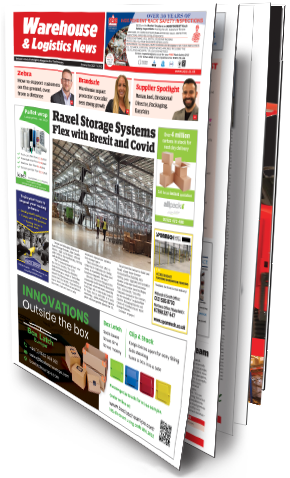 Welcome to the January 15th issue of Warehouse & Logistics News. The recent changes in the commercial world caused by Brexit and the growth of internet sales caused by Covid have led to some major projects for Grantham-based Raxel Storage Systems. Raxel won a contract with a third-party logistics firm to build and install a large three-tier new mezzanine floor, lighting, data cabling, power upgrades and sprinkler systems at a new multi-customer distribution centre.
Welcome to the January 15th issue of Warehouse & Logistics News. The recent changes in the commercial world caused by Brexit and the growth of internet sales caused by Covid have led to some major projects for Grantham-based Raxel Storage Systems. Raxel won a contract with a third-party logistics firm to build and install a large three-tier new mezzanine floor, lighting, data cabling, power upgrades and sprinkler systems at a new multi-customer distribution centre.
CLICK HERE TO LAUNCH THE DIGITAL EDITION OF WAREHOUSE & LOGISTICS NEWS MAGAZINE
Briggs Equipment, the UK’s premier asset management and engineering services specialist, has underlined its ongoing commitment to sustainability by becoming an officially accredited carbon neutral business. Working with Carbon Neutral Britain, the company is offsetting its carbon footprint via approved projects that contribute towards protecting the environment and supporting communities across the world with sustainable development. Additionally, Briggs is pledging to plant a tree for every new machine it sells.
Box Latch Europe, the US-based manufacturer of re-usable corrugated box closure solutions, has recently launched an e-commerce platform through which customers can order their innovative products. Distributed in the UK & Western Europe by Item Products, a leading designer and producer of components for the packaging industry, Box Latch Europe aim is to create sustainable packaging by making boxes re-usable many times over.
Following extensive redesign, manufacturing and on-site testing across the world, Stertil Dock Products has launched its latest generation Combilok G2 automated vehicle restraint system. Featuring a unique, advanced operating system, Stertil’s new fully-patented Combilok G2 effectively blocks one of the rear wheels of a vehicle during the loading and unloading process in order to prevent accidents to personnel and damage to goods, vehicles and the warehouse building. Various dangerous situations are prevented by the new Combilok G2 including premature “drive-offs”.
With the continued growth of online shopping and operators under pressure to provide a speedy delivery, logistics facilities are making every effort to ensure they are running at full capacity and eliminating downtime. This means warehouses have to take preventative measures to maintain the safety and efficiency of the site. Although the Safety at Work Regulations do not cover how often industrial doors should be serviced, twice a year is probably sensible, says our doors and curtains feature.
The global warehouse automation market will grow from £21.9bn in 2020 to £51bn in 2025, new research by Interact Analysis reveals. Fixed automation such as AS/RS, conveyors and conveyor-based sorters will remain the most common form of automation for the foreseeable future, but there is a rapidly growing trend for warehouses to adopt more flexible mobile automation solutions, according to our warehouse automation and robotics feature. By partially replacing manual labour, automation and robotics are helping warehouses meet the increased demand created by the rising e-commerce market.
Enjoy reading the issue.
James Surridge
Publishing Editor




Comments are closed.